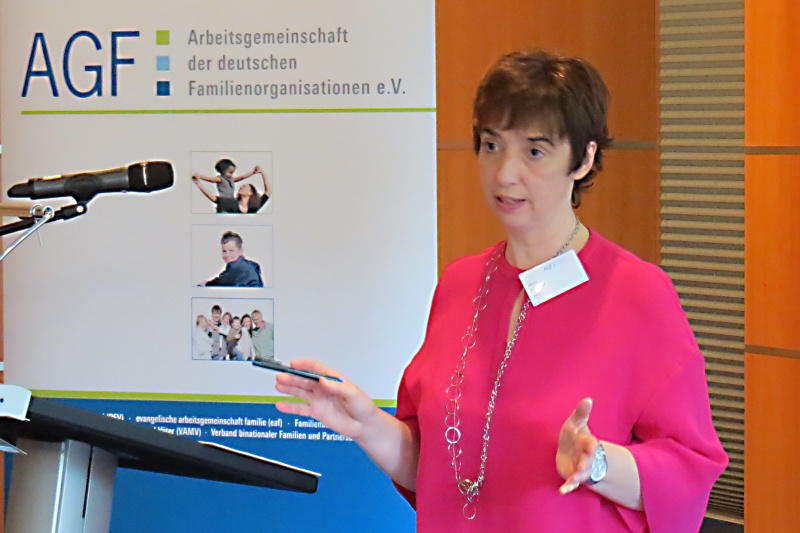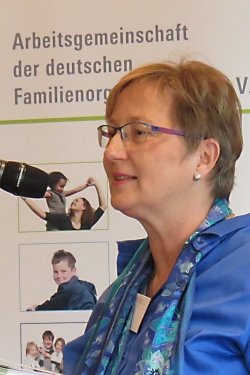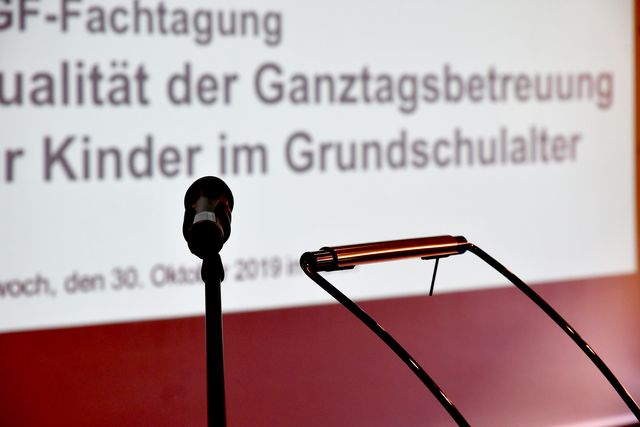On 30 October 2019, the AGF symposium “Quality of all-day care for children of primary school age” took place in Berlin. More than 70 participants from science, practice and politics discussed quality aspects in regards to the planned expansion of all-day care for children of primary school age. Within the framework of the German Social Law (SGB VIII), the legal entitlement for all-day child care for children in primary school age is to be implemented as a joint task of the Federal Government, the Bundesländer and the municipalities by the year 2025. The symposium focused on the question on how quality of this offer should look like from the point of view of families.
The AGF took up this topic, because this represents an urgent problem for many parents and children. After the introduction of a legal claim to all-day care in day-care centres and the subsequent expansion of those, many parents are again faced with the question of the possibility, reliability and quality of all-day care during the transition of children to primary school. The regionally very unequal availability of such services is a major obstacle to parents returning to work or expanding their gainful employment in some regions. In addition, the potential of all-day schools/full-day care to compensate for socially unequal starting opportunities in school education has so far been insufficiently exploited.
Morning programme
In the first part of the morning conference, which was moderated by Sven Iversen (AGF), Marion Binder of the Federal Ministry for Family Affairs, Senior Citizens, Women and Youth (BMFSFJ) first presented the reasons and goals of the Federal Government for the initiative to expand all-day care for primary school children. The aim of the BMFSFJ and the BMBF (Federal Ministry of Education and Research) is to create a legal entitlement to all-day care for primary school children by 2025. This should be so flexible that it remains possible for the Bundesländer and local authorities to retain and further develop existing models of full-day care. Due to the distribution of competences between the Bundesländer (being responsible for schools) and the federal government (being responsible for children and youth welfare), the federal legal entitlement can only be regulated by the federal government in Book VIII of the Social Code (German Federal Social Law). At present, the federal government has earmarked two billion euros for investments in all-day schooling and childcare facilities. The coalition agreement also includes a formulation on the running costs of all-day care which needs to be specified in negotiations between the federal government, the Länder and the municipalities: “The federal government will ensure that in particular the running costs of the municipalities are taken into account”.

Against this background, Ms Binder reported on challenges and problems in the process of introducing the legal claim. One of the challenges is the unequal starting position in the federal states. This applies not only to the very different quantitative development of all-day childcare services in the Länder, but also in particular to the diversity of existing models of all-day childcare for the age group concerned. Some Länder rely almost exclusively on all-day schools, others almost exclusively on day nurseries. In addition, there are Bundesländer with a mix of all-day school offers, after-school care and other afternoon care offers.
A comparability within the diversity shall be created by a uniform definition of the all-day entitlement. The legal entitlement will apply nationwide to grades 1 to 4, cover 8 hours per day on 5 days per week and is also to apply during holidays with the exeption of a maximum of 4 weeks, in which facilities may be closed.
Ms Binder described the negotiations between the Federal Government, the Länder and the municipalities as extremely constructive. Since at all federal levels the parents’ need for a full-day care service is clearly articulated, there is an increased willingness to successfully conclude negotiations on a distribution of financial burdens. However, more recent calculations based on higher student forecasts point to significantly higher costs than was foreseeable at the time of the coalition negotiations. According to these new calculations, the necessary investment costs rose to 5 to 7.5 billion compared to the planned 2 billion. From the point of view of the federal states and municipalities, however, the greater hurdle for the introduction of the legal claim was the willingness of the federal government to participate in the running costs of all-day care. A viable agreement must be reached here, otherwise the legal claim could not be implemented.
Mrs. Professor Dr. Frauke Mingerzahn of the university Magdeburg-Stendal lit up the heterogeneity of the models of the all day care in the primary school age as well as the different conceptions of all day school and after-school care that the models are based on. In her presetnation “What quality does the all day care of children in the primary school age need?” she then pointed out, that all the models have in common, however, that primary school children actually spend very large numbers of hours in all-day care. The quality requirements for this system must be correspondingly high.

The central topics of her lecture were the qualitative needs and requirements of children and parents for all-day care. From the perspective of the “big children” (approx. 6-13 years), the needs for their development needs had to be taken into account in all-day care. This includes that children have free spaces in the areas “movement, dexterity, body experience”, “independent activities, exploration of the world”, “encounter, confrontation with other children, retreat-recreation” as well as “acquiring knowledge and skills”, can gain experience and experience themselves as self-effective persons. On the other hand, full-day care must take account of the fact that children bring special previous experience and support needs to the institutions, depending on their circumstances.
In general, the demands and expectations placed on the after-school care of the children are directed at aspects such as relaxation, time for friends, play and sport and the possibilities of making free arrangements, but also the reliability of structures. For parents, on the other hand, the focus would be more on criteria such as professional care, homework, the systematic support of children and the compatibility of family and career.
Against this background, she discussed the question of what understanding of education, upbringing and care should form the basis of the all-day claim. For example, the educational understanding of all-day care should not be based exclusively on knowledge transfer, but education had to be understood as a social process and communicative activity as well as self-education of the child. Teachers and educators would therefore necessarily also be asked upon in changing roles: not only as experts, but also as co-designers of educational processes or as initiators and observers.
On the question of whether there was a conflict of objectives between quality and quantity in the expansion of all-day care, she pointed to the high challenges facing each federal state. For example, it was already a problem to cover the demand for skilled workers. Within the next 10 years, there would be a high number of retirements among educators and primary school teachers. At the same time, the after-school care for skilled workers would not be an attractive job, as full-time work would hardly be possible or commuting between different places of employment such as nurseries and after-school care would be associated with it.
Afternoon programme
Three working groups were held in the afternoon of the meeting.
AG “Quality criteria for the all-day care of children of primary school age”
In this working group, Prof. Dr. Falk Radisch presented research results on various quality aspects of all-day care, which apply to both day care and all-day school solutions. Esther Ullmann-Goertz of the eaf took over the moderation of the AG.
Prof. Dr. Radisch presented the success factors of good all-day schools and good all-day supervision. These include aspects which he explained in the brochure “Mehr Schule wagen – Empfehlungen für guten Ganztag” (Dare More School – Recommendations for a Good All Day School), such as “Time and Structure”, “Governance and Further Development”, “Professions and Forms of Cooperation” and “Spatial Requirements”.
At the centre of the working group discussion were questions concerning the training of future teachers and educators for primary schools. In times of a general shortage of skilled workers, more attention should also be paid to the recruitment and qualification of university teachers for the training of these groups. Another topic was differences between urban and rural areas in the environmental factors of all-day childcare.
AG “Cooperation in all-day primary schools – intraprofessional, interprofessional and multiprofessional across school boundaries”
While the conference generally focused on the all-day care of children of primary school age in all-day schools as well as in after-school care centres, this working group focused exclusively on the experiences in all-day schools. The second thematic specification of the working group was that not all quality aspects were addressed, but particularly the specific requirements for cooperation in all-day schools. Birte Marquardsen from the service agency “Ganztägig lernen” reported on the practical counselling work in Berlin. Mrs. Hiltrud Stöcker-Zafari from the binational families organisation took over the moderation of the AG.
Ms. Marquardsen explained that the Berlin experience showed that the parents often could not recognize which type of all-day school was available and the different types of all-day schools could not be clearly distinguished from each other.
She pointed out, among other things, the great importance of cooperation as a central quality feature for successful all-day schools. Cooperation can only be developed jointly by the experts of the professional groups involved. Cooperation processes in an all-day school setting require a high degree of communication. This demands learning processes from all actors, for example in order to be able to deal with the different approaches and technical languages of the different professions. In general, cooperation processes in all-day schools are susceptible to external influences and there is a need for a recurring understanding of the rules of cooperation.
AG “Financing all-day care for children of primary school age” (in German)
In this working group, Dr. Christian Alt of the DJI (German Youth Insititute) presented the updated calculations of the DJI report on the costs of expanding all-day care for children of primary school age. The update of the report had become necessary because a new population projection was presented by the Federal Statistical Office in June 2019, which assumes a significantly higher number of children in the coming years than in the original report. For the year 2025, around 3.3 million children aged between 6.5 and 10.5 years are now expected throughout Germany. This will also increase the needed number of child care places that had been calculated by the DJI. In order to be able to provide a place for all primary school children, who are expected to have a need for all-day care in 2025, about 820,000 new places would have to be created in the next six years.
Dr. Alt explained in detail the assumptions made for the calculations, which have influence on the quality of the all-day care. The AG was moderated by Matthias Dantlgraber from the FDK.
Panel discussion

At the end of the conference there was a panel discussion in which Marion Binder (BMFSFJ), Prof. Dr. Falk Radisch (University of Rostock), Dr. Elke Alsago (ver.di), Jörg Freese (Deutscher Landkreistag) as well as Daniela Jaspers (VAMV and AGF) participated. The panel discussion was moderated by Andreas Zieske (eaf).
It summarized the results of the previous discussions and took up aspects which have not yet been sufficiently highlighted by the lectures and working groups in the conference. This particularly concerned the question of recruiting skilled workers and the perspective of skilled workers (educators, social workers and teachers) as well as the perspective of municipalities and districts on the care situation of children of primary school age and on the initiative of the Federal Government.
Ms Jaspers highlighted that a legal claim to full-day care is highly desirable from the point of view of families. In general, for many families, (the missing of) full-day care at primary school age is a problem. She pointed out that there was a great deal of uncertainty for parents before the transition from the childs daycare to primary school. This highly depends on the regional offer, as to whether high qualitiy full-day care for one’s own children can be found.
This is a decisive prerequisite, though, for mothers to resume or continue their gainful employment. However, families are very different and there are specific needs depending on the type of family. For example, good care for marginal periods is particularly important for single parents. In this context, Ms Binder pointed out that the planned expansion of full-day care would also be supported by employers’ associations, which hope, among other things, that mothers will thus be available to the labour market for a greater number of hours.
Overall, the discussion showed that the issue of the quality of all-day care at primary school age is highly complex. The different models for ensuring all-day care entail that, among other things, the action logic of the “school” and “child and youth welfare” systems partly operate side by side and partly have to be taken into account in their interactions. Different educational, upbringing and care concepts of these systems, but also of the professions involved, as well as the needs and requirements of parents and children must be taken into account. Furthermore, there are no cross-system regulatory competences at the federal or Länder level to be able to regulate quality issues for schools and the SGB-VIII area at the same time.
In the morning session Prof. Dr. Mingerzahn had described in a very impressive way that – in view of the long times children spend in all-day care – a discussion on quality was urgently needed. In full-day care, the children’s scope for participation in shaping everyday life at school and after-school care must be significantly increased, so that “school as a place of learning can become school as a place to live”. Children must be able to help shape structures and processes in all-day care more strongly than before, regardless of which model is chosen to ensure all-day care. In addition, the scope for cooperation between the actors involved in all-day care must be increased. This includes adapting the cooperation culture in the institutions to ensure financed cooperation times and further training. In addition, flexible framework conditions must be provided for cooperation with parents and external institutions such as sports clubs, music schools and extracurricular educational opportunities. It has been repeatedly stated that the quality requirements should not be too dirigistic and narrow from a technical point of view, since the models of all-day care existing in the Länder are too different for standardisation. It was also suggested that the process of introducing a legal entitlement to all-day care would be overburdened if one expected to be able to resolve all desirable quality developments in all-day schools and hoards within the framework of this legislative project.
Ms. Alsago from ver.di very impressively presented the current work situation of educators against the background of the expansion of the childcare system in Germany and the generally growing responsibility of the skilled workers in it. She pointed out a high shortage of skilled workers in all areas of the system of child day care and child and youth welfare, which not only affects day nurseries and all-day schools.
In her opinion, the output of the training system is currently disproportionate to the demand. The approximately 35,000 college graduates per year face a demand of approximately 85,000 graduates per year. Training and the field of work must become much more attractive. This would include, among other things, giving more attention to the possibility of full-time work for nursery nurses in after-school care. In addition, more resources are needed in the area of training, for example to be able to provide more university teachers for the training of nursery nurses.
Mr. Freese presented the perspectives of the municipalities on the initiative of the Federal Government. From his point of view, the political process was much further advanced than all participants considered possible at the beginning of the negotiations. However, it is the municipalities that have to shoulder the permanent operating costs of the federal government’s legislative initiative as things stand at present. Here a fair balance must be met and the announcement of the federal government that the current cost load of the municipalities is taken into account, must be concretized.
On the other hand it is the municipalities, which must create local solutions for problems such as the lack of specialists, on whose emergence and solution they have only little influence. In order for the argument of increasing equal opportunities, i.e. good education for all children, to have an impact, the equipping of all-day schools and day nurseries with well-trained specialists is a decisive prerequisite.
Altogether it became clear in the context of the conference that the introduction of the legal claim to all-day care at primary school age is a fragile process and not a self-runner. For the federal government, the Länder and local authorities, the legal entitlement entails new financial burdens. So far, the negotiating parties have expressed the will to create the new claim and to arrive at a fair financial solution. This includes, above all, the distribution of the running costs of all-day care. The Federal Government, the Länder and the municipalities seem to be relying on first reaching a basic agreement on the sharing of the financial burdens. The high quality of all-day care is particularly important for parents’ and trade associations. They face the challenge of developing tailor-made quality impulses in the current uncertain political negotiating situation.
At the end of the event, Ms Jaspers pointed out that the AGF would continue to actively accompany the political process and concluded the conference.

